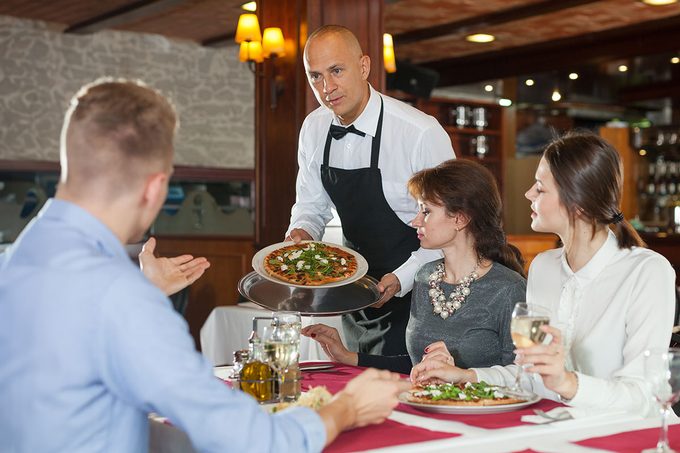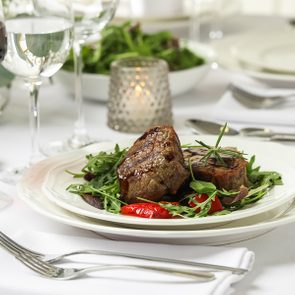This simple dining habit is more annoying than you think. Especially if you do it four times in five minutes.

Don’t Make This Rude Mistake at Restaurants That Servers Absolutely Hate—Chances Are, You’re Doing It!

“Oh, just one more thing …” As a former waitress, those five innocent little words could make my stomach drop faster than a tray of margaritas on a sloped patio. Not in a disaster way—like “I just found this in my food”—but in that mildly soul-sucking way, like “I forgot to mention I’m using a coupon.” That’s because that phrase generally preceded a mildly rude mistake at restaurants that many customers make—and most of them don’t even realize they’re doing it.
“This habit does bother me, especially when I was first starting out as a server and was relatively inexperienced, because it really slows everything down,” says Stephanie S., a server at a chain restaurant in Utah. “I felt like people were being too needy, and it stressed me out.” To be fair, she admits it got easier with experience. Now, she sees it more as a mismatch between customer expectations and a server’s bandwidth, with a sprinkle of thoughtlessness.
Context matters too. “I’ll admit, it kind of makes me hate people if they do this at peak dinner rush,” says Sarah S., a server at an Asian-fusion restaurant in Florida. “When we’re slammed, it turns into a logistical nightmare, but when we’re not busy it’s not a big deal and I don’t mind as much.”
What is this habit that Stephanie and Sarah are talking about? Turns out, it’s a common pet peeve of servers—and it has a name. Read on to find out if you’re making this rude mistake and get tips from servers about what to do instead.
Get Reader’s Digest’s Read Up newsletter for more etiquette, humor, travel, tech and fun facts all week long.
What is the rude habit?

It’s called “one-timing.” And no, it’s not the new dating term for monogamy or a line-dance move. One-timing happens when a diner calls the server over repeatedly, asking for just one more thing each time—extra napkins, then a side of Ranch, then lemon for the water, then a spoon for the soup, more ice in their drink … and so on. In isolation, each request is reasonable. Together? It’s the restaurant version of death by a thousand cuts.
This happens because “customers forget to ask for everything they need and the server fails to anticipate their needs,” says April O., a server at a chain restaurant in Texas. “If both server and patron are doing their parts, there shouldn’t be any ‘one-timing.'”
Of course “shouldn’t” and “isn’t” are two very different things—and the reality is, customers do this all the time. So often, in fact, that servers should build it into their game plan. “At the end of the day, this is part of my job,” says James L., a server at a high-end restaurant in California. “And when I feel myself getting annoyed on my fifth lap around the kitchen, I remind myself it’s not fair to get mad at people for asking me to do what I’m literally here to do.”
Why do servers hate it?
Honestly, because it’s exhausting. Restaurants run on efficiency, timing, elbow grease and the fragile hope that no one orders a well-done steak five minutes before closing. So when a server has eight tables and one of them keeps summoning them like a genie, it throws the whole flow off, especially during peak times.
And it’s not just about logistics. It’s about feeling respected as a human and not a condiment concierge. “People constantly asking for one more thing makes me feel like they don’t care about my time or how exhausted I am,” Sarah says. “It’s like they just see me as their personal errand girl.”
Some seasoned servers have learned to guard against one-timing, cutting it off before it even happens. “To reduce these kinds of guest requests, I always try to anticipate needs—especially for big parties or families with little kids, who are the most likely to one-time me to death,” says Valerie P., a server at a family restaurant in Washington. Her go-to moves: Bring crayons and a pitcher of water immediately, and swap out the half-empty ketchup bottle when everyone orders fries. It’s basically clairvoyance, but channeling condiments.
Not every server hates it, though. Sometimes one-timing pays off—literally. “I find that the more gracious and responsive I am to these little requests, the better the customers appreciate me and the better they tip,” James says. “Being helpful doesn’t just keep things running smoothly; it boosts the gratuity too.”
What should you do instead?
This isn’t a guilt trip. It’s a gentle nudge (with a butter knife). Next time your server comes by and asks if there’s anything else they can get you, that’s your cue to do a quick mental inventory and ask for all the extras you need at once.
If you’re with kids or a large party (more than eight people), double the prep. “Take a minute before ordering, and ask your group who needs what,” Valerie says.
And if you’re a person who is chronically thirsty (hi, same), just say so up front. “Ask for an extra glass of water with your drink order,” April says.
What if you forget to ask for one item you really need?
You’re human. Your toddler just dunked a chicken tender in her milk. Your mother-in-law just texted that she’s staying for a month. You’re still replaying that weird comment you made at brunch last weekend. It happens. So what if you genuinely forget something mid-meal? Here’s your cheat sheet for what to do (and how not to become that table):
- Salt and pepper: Let it go. You’ll survive a slightly under-seasoned bite.
- Your toddler is on the verge of a breakdown due to a missing chocolate milk: Go ahead and flag the server—or the busser or a passing angel. “I would much rather grab the thing than have the whole restaurant listen to a crying child,” Sarah says.
- You dropped your knife on the floor: “Don’t wait for your server,” Stephanie says. “You can politely wave down the closest employee.”
- You need extra napkins: Ask politely. For more casual restaurants, you can grab napkins from an empty table nearby, Sarah says.
- You want to compliment the chef on the creme brulee: “Compliments are never annoying,” James says. “Servers live for that stuff!”
If you’re worried about bothering them at all, don’t be. “This is our job, we’re literally called servers because we are here to serve you,” James says. “But it is polite and it makes our job so much easier if you plan ahead a little bit.”
Besides, it’s not all on you. “Most of those are things a good server should already be anticipating,” April says.
What if you end up asking for an excessive amount of extras?
It happens from time to time. And when it does, there are two golden rules:
-
Be nice. “Polite customers? I’m happy to grab them anything,” Valerie says. “But if you’re snappy or entitled? I’m avoiding your table and probably not even making eye contact.”
-
Tip generously. “If you know you’ve taken up extra time and attention, consider tipping a little more to show your appreciation,” James says.
RELATED:
- New Poll: 60% of Travelers Can’t Stand This Rude Hotel Habit
- Is It OK to Snack on Your Groceries Before Paying for Them? Here’s What the Experts Say
- What You Need to Know About “Speaker Scum” Before Your Next Flight
Why trust us
Reader’s Digest has published hundreds of etiquette stories that help readers navigate communication in a changing world. We regularly cover topics such as the best messages to send for any occasion, polite habits that aren’t as polite as they seem, email and texting etiquette, business etiquette, tipping etiquette, travel etiquette and more. We’re committed to producing high-quality content by writers with expertise and experience in their field in consultation with relevant, qualified experts. We rely on reputable primary sources, including government and professional organizations and academic institutions as well as our writers’ personal experiences where appropriate. For this piece on rude restaurant mistakes, Charlotte Hilton Andersen tapped her experience as a longtime journalist who specializes in etiquette and communication for Reader’s Digest. We verify all facts and data, back them with credible sourcing and revisit them over time to ensure they remain accurate and up to date. Read more about our team, our contributors and our editorial policies.
Sources:
- Stephanie S., server at a chain restaurant in Utah; in-person interview, June 26, 2025
- Sarah S., server at an Asian-fusion restaurant in Florida; phone interview, June 26, 2025
- April O., server at a chain restaurant in Texas; phone interview, June 26, 2025
- James L., server at a high-end restaurant in California; phone interview, June 26, 2025
- Valerie P., server in Washington; email interview, June 26, 2025



